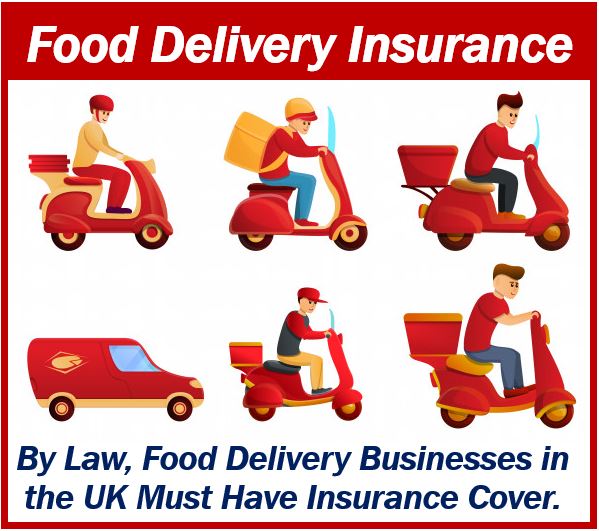The requirement of food delivery insurance for couriers is mandated by UK law. Today these couriers are the people who are now taking essential food items to those in need during the lockdowns due to the COVID virus.

The COVID virus has changed the way most restaurants are allowed to serve food. With in-restaurant seating limited or not permitted, the pick-up and home delivery of meals has exploded in popularity. This has opened the door for many who are unemployed to use their vehicles and begin as a courier in the food delivery business. A word of caution, standard car insurance is not sufficient. For an indication of courier insurance options available visit compare courier insurance.
Can anyone deliver food?
Yes, anyone can deliver food, but if you are being paid, there are certain essentials you need to do so it can be done legally. This includes food delivery insurance for your vehicle.
Since the driver is being paid to be on the road and deliver food to their clients, a commercial Class A (1) business use insurance for the vehicle is required for those who have a small service area. Class C (3) business use is for larger service areas. A standard Social, Domestic and Pleasure vehicle insurance policy prohibits the vehicle to be to deliver any items and get paid for it.
What is this type of insurance called?
In the insurance industry each firms label classifications slightly different to help make their policies stand out amongst the crowd. Food delivery insurance is no different. Many of the names are used to help the firms focus on a target audience.
The UK government classifies this type of insurance as ‘Hire for Reward’. Other popular names used in the insurance business sector include food delivery insurance, courier insurance, fast food delivery insurance, Zego insurance, delivery driver insurance and parcel delivery insurance.
What types of vehicles can be used as food delivery vehicles?
There are many types of vehicles that can be used to make food deliveries. As long as it has wheels and rolls it is a suitable candidate. This includes cars, vans, trucks, motorcycles, mopeds and even bicycles. All of these forms of transportation require road risk insurance except the bicycle. The minimum level of road risk is Third Party only.
For bicycles and motorised vehicles, the recommended insurance is Public liability. This is not required by law, but should be included just in case a third party files a lawsuit claiming damage. The most popular add-on is ‘Goods in Transit’ which protect the items being transported if they are stolen or damaged before they reach the client.
What would be the ideal food delivery vehicle?
The ideal vehicle to deliver food would be one that fit the needs of the service area. For those with a small service area and employed by a restaurant a bicycle would be the most economical. For larger service areas greater than 5k then a motorised vehicle is recommended so the food gets to the clients while it is still warm and it can be completed in less than 20 minutes.
With the price of petrol and diesel being higher than electricity, many couriers are using electric vehicles. Hybrid vehicles are also very popular and cost efficient to operate.
When it comes to insuring a mode of transportation, the smaller the vehicle is physically the lower the insurance costs. This is also true with the smaller the engine displacement the lower the risk to the insurance firm thus lower policy costs.
Another path to lowering the cost of food delivery insurance is to keep the vehicles used to make the deliveries in a safe location when not in use. This can be in a locked garage, shed or in a home if the vehicle is a bicycle or moped. If you wish to give this type of business a trail you could consider tale out a temporary policy, for example one day van insurance.
The road risk portion of food delivery insurance is required by UK law. The add-ons of public liability, breakdown cover and good in transit help protect the courier financially so they can continue to work and bring in a revenue stream to feed their family.
Interesting related article: “What is Insurance?”

